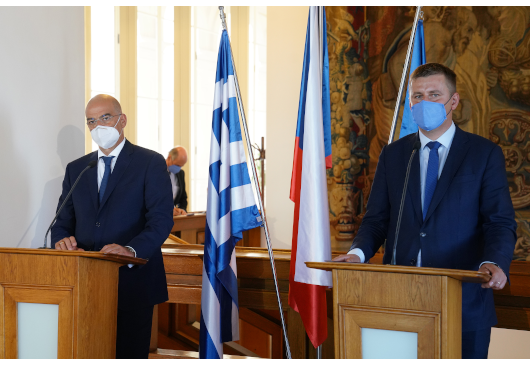 Today, I have the great pleasure of being in Prague and meeting in this wonderful palace with my friend and colleague, the Minister of Foreign Affairs of the Czech Republic, Tomas Petricek, with whom I had the opportunity to discuss bilateral issues as well as European and regional issues.
Today, I have the great pleasure of being in Prague and meeting in this wonderful palace with my friend and colleague, the Minister of Foreign Affairs of the Czech Republic, Tomas Petricek, with whom I had the opportunity to discuss bilateral issues as well as European and regional issues.
First of all, we looked at the level of our bilateral relations, which I must say are excellent, but which can also be improved. We discussed the potential for further cooperation in the economic sector, on investments – a further increase in our trade. As Tomas said earlier, our transactions reached $750 million, but this doesn’t mean that we can’t increase them further. There is much we can do in the trade sector and in the sector of mutual investment and transfer of know-how from one side to the other.
As Tomas said, we also talked about Belarus. For Greece, the Belarus issue is one of Democracy – implementation of the rule of law and a matter of human rights. Greece is not close to the region. It raises matters of principle. It is determined to follow the example and the leadership of the countries of the European Union that are closest to Belarus and have a better knowledge of the situation. The Czech Republic is one of these countries, and this is why Tomas and I discussed in detail what we can do to help the situation in Belarus. To show our commitment to human rights and to the rule of law, and at the same time not create undesirable side-effects. Greece will follow the example of the countries much closer to Belarus with regard to this unacceptable situation.
Of course, we had the opportunity for an in-depth discussion of the migration issue. First of all, with regard to the causes of the phenomenon, with regard to the ways of responding, with regard to the ways to protect our societies but also the human rights and rights to asylum, as well as with regard to the creation of a programme for the return of those who are not eligible to remain in the European Union, to their countries of origin.
As I have already said, we discussed the return of those not eligible for asylum to their countries of origin. We discussed the creation of a programme for cooperation with countries of origin so that they can take back their citizens, and we discussed how we might use the funds available to us as development assistance for the countries of origin, in order to respond to the problem at its root.
We also talked about protection of the EU’s borders – the borders of our Union. As you know, Greece is a country that defends the borders of the EU, and I thanked Tomas for the assistance with which the Czech Republic made its presence felt, not only with regard to the developments in Moria, but also during the crisis in Evros this past February and March.
We all remember Turkey’s attempt to instrumentalize the migration crisis at that time in order to exert pressure on the EU and Greece. At that time, we proved that we can defend Europe’s borders in a serious and responsible manner.
We also had the opportunity for an in-depth discussion of the situation in the Eastern Mediterranean and Turkey’s illegal actions in the Greek continental shelf, as well as the violations of the sovereignty and sovereign rights of the Republic of Cyprus.
I think our common goal is for the problems to be resolved through dialogue, but in a framework of implementation of international law and the Law of the Sea, where attempts to impose one’s will by force have no place or point.
Greece is always ready to discuss with Turkey the existing dispute over the boundaries of the continental shelf and exclusive economic zone, provided, however, that Turkey stops its provocations and illegal actions.
But we are asking our friends and partners in the European Union for a list of sanctions to be prepared. Sanctions that we do not want to see imposed on Turkey at this moment, but that need to exist in order to show Turkey what will happen – and we hope this can be avoided – if it returns to the policy of illegal actions.
We also touched on very important issues, but time constraints forced us to put off our discussion until Tomas’s upcoming visit to Athens – and I am referring to the accession perspective of the Western Balkans and the general situation in the Western Balkans.
My dear Tomas, thank you very much for your hospitality, and I will be very happy to see you again – first, in Brussels this Monday, at the Council meeting, but mainly I look forward to our upcoming meeting in the Greek capital, Athens. Again, thank you very much.
September 18, 2020


